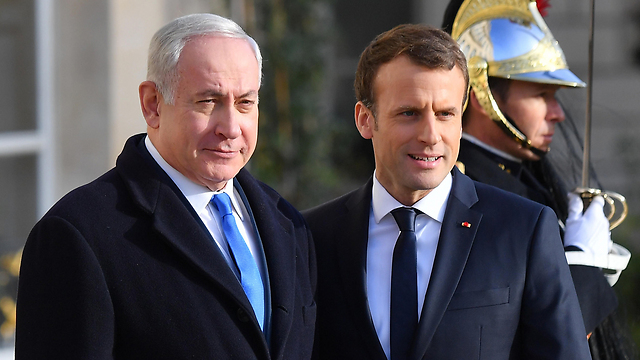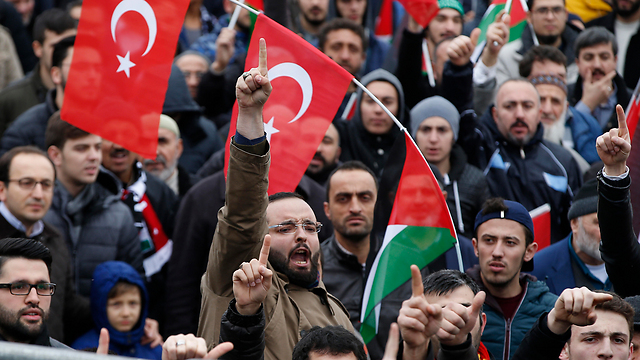
Israel and Turkey on a course of collision?
Analysis: Despite Sunday’s heated exchange of words between Prime Minister Benjamin Netanyahu and President Recep Tayyip Erdogan, Israeli officials believe the Turkish leader won’t sever diplomatic ties with Israel, as he would lose the option of helping the Palestinians in Gaza and would have no access to the Temple Mount.
The diplomatic crisis between Israel and Turkey heated up again this week following US President Donald Trump’s recognition of Jerusalem as Israel’s capital, with a serious exchange of verbal attacks between the countries’ leaders—as Prime Minister Benjamin Netanyahu delivered his most scathing attack on Turkish President Recep Tayyip Erdogan, who described Israel as “a terrorist state that kills children.”
Erdogan, who had threatened even before Trump’s announcement that his country’s response to any change in Jerusalem’s status could go as far as cutting diplomatic ties with Israel, said in a fiery speech Sunday that “Palestine is an innocent victim. As for Israel, it is a terrorist state, yes, terrorist!"
“We will not abandon Jerusalem to the mercy of a country that kills children,” the Turkish leader added.

In stark contrast to his harsh words, Erdogan also chose to mention the historical ties between Turkey and the Jewish people. “For us, it doesn’t matter who is the oppressor and who is the oppressed, and we would not avoid standing up against those who oppress others—even if they are our brothers. Our history includes many examples of that,” he said, noting that the Ottoman Empire had taken in Jews who were expelled from Spain, as well as Jews who fled Russia in the 19th century, and that Turkey had also welcomed Jews during World War II.
Erdogan’s vitriolic comments did not go unnoticed by Prime Minister Netanyahu, who took off his gloves during a joint press conference with French President Emmanuel Macron and hit back at the Turkish leader in an unprecedented attack: “We won’t take any lectures from Erdogan. I’m not used to receiving lectures about morality from a leader who bombs Kurdish villagers in his native Turkey, who jails journalists, who helps Iran go around international sanctions and who helps terrorists—including in Gaza—kill innocent people.”

State officials feared that Erdogan would respond to Netanyahu's attack with a drastic move. The response finally arrived from the Turkish president’s close advisor, Ibrahim Kalin: “We condemn in the strongest possible terms Israeli Prime Minister Netanyahu’s remarks targeting the Republic of Turkey and President Recep Tayyip Erdoğan,” the spokesperson said, adding that Israel, “which disregards international law, has occupied the Palestinian people’s hundreds-of-years-old homeland and systematically violates United Nations resolutions, must first account for its own actions.”
The Turkish president’s advisor added that “just like Turkey is all over the world, it will keep being in Palestine to support those who are right, the law and the oppressed.”
‘No diplomatic breakthrough in Erdogan era’
But despite the heated exchange of words, state officials in Jerusalem believe Erdogan won’t sever diplomatic ties with Israel, as he would lose the option of helping the Palestinians in Gaza and would have no access to the Temple Mount.
Senior Israeli officials admit, however, that Erdogan’s reactions are not necessarily rational and that emotional responses should also be taken into account. Experts on Turkey, who are finding it hard to believe that Erdogan will restrain himself following Netanyahu's comments, are not ruling out the possibility that he will take protest measures like recalling the Turkish ambassador for consultations in Ankara.
There is a diplomatic dialogue going on between Israel and Turkey, and the communication channels are constantly maintained. There is a general understanding, however, that as long as Erdogan remains in power we will see no diplomatic breakthrough and the relations will be kept low-profile, possibly developing on the economic, tourist, cultural and other levels.
Erdogan is presenting himself as the Palestinians' defender and as Hamas’ patron, which is why it is in his best interest to maintain a dialogue with Israel. He only stands to lose from cutting Turkey’s relations with Israel. In Israel, Erdogan is respected but suspected. Israeli officials understand that he can do no good.
On the other hand, there are those in Israel who believe that tightening the economic ties with Turkey, focusing on the gas deal, would strengthen the relations and add a strategic dimension to them. Nevertheless, that doesn’t stop Israel from pursuing the European gas channel vis-à-vis Cyprus, Greece and the European Union.
Russian gas instead of Israeli gas
Last Tuesday in Nicosia, the energy ministers of Cyprus, Greece, Israel and Italy signed a memorandum of understanding for a planned gas pipe from Israel to Italy, declaring it a strategic infrastructure project representing an interest shared by the countries and the EU involving natural gas. The planned pipe will be 2,100 kilometers long and its estimated cost is NIS 25 billion (roughly $7 billion). Its construction is expected to be completed in 2025.
The gas pipe would guarantee a long-term export route of Israeli gas to Greece, Italy and other European markets and boost competition in the gas field. As the ministers announced in their joint press conference, the project would strengthen the EU’s energetic security and diversify Europe's sources of natural gas supply.
The EU representative estimated that Europe would need to import an additional 100 billion cubic meters of natural gas a year compared to what it currently imports due to the drop in gas production in the Northern Sea. Europe sees Israel and Cyprus as a secure source for future gas supplies.
The energy ministers expressed their desire to cooperate in research related to the construction and operation of the project. A team comprised of the director-generals of the countries’ energy ministries, which was formed by the energy ministers last April in Tel Aviv, will keep meeting to discuss the principles of the governmental agreement between the four parties, which is expected to be signed in 2018.
Erdogan wanted to sign a gas deal with Israel in the past to diversify Turkey’s energy sources, primarily as an alternative to Russia. In the past year, however, his relations with Russian President Vladimir Putin warmed up, especially on the backdrop of the ceasefire agreements in Syria.
Todays, it seems Erdogan needs Russian gas more than he needs Israeli gas. President Putin was expected to arrive in Ankara on Monday for an official visit, which would include his sixth meeting with Erdogan this year. During the meeting, they were expected to discuss the situation in Syria, the crisis around the US recognition of Jerusalem as Israel’s capital, as well as the gas issue and the plan that Russia would build a nuclear reactor for energy purposes in Turkey.












